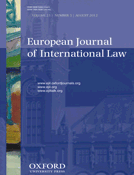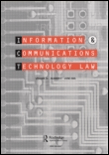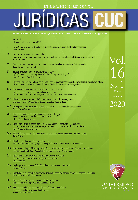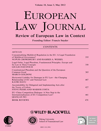
Law Technology and Humans
Scope & Guideline
Advancing Knowledge at the Intersection of Innovation and Law
Introduction
Aims and Scopes
- Interdisciplinary Exploration of Law and Technology:
The journal focuses on the interplay between legal frameworks and emerging technologies, analyzing how innovations such as AI, big data, and digital governance reshape legal practices and societal norms. - Regulatory and Ethical Implications:
It examines the regulatory challenges posed by new technologies, advocating for ethical considerations in the development and implementation of laws that govern technological advancements. - Impact of Digitalization on Human Rights:
The journal addresses how digital technologies affect human rights, privacy, and individual freedoms, emphasizing the need for legal protections in an increasingly digital world. - Focus on Global Perspectives:
It highlights diverse global perspectives on technology and law, considering case studies from various countries to understand local contexts and international implications. - Innovative Legal Practices:
The journal encourages discussions on innovative legal practices, such as the use of AI in legal decision-making, digital contracts, and the evolving role of legal professionals in a technology-driven landscape.
Trending and Emerging
- AI and Machine Learning in Legal Contexts:
There is a growing focus on the implications of AI and machine learning in legal practices, including their potential benefits and challenges in judicial processes, contract drafting, and regulatory compliance. - Digital Governance and Policy Frameworks:
Recent publications emphasize the importance of digital governance, exploring how technological advancements influence public policy and regulatory frameworks in various jurisdictions. - Intersection of Technology and Human Rights:
A significant trend is the exploration of how technology intersects with human rights issues, particularly in contexts such as surveillance, data privacy, and the regulation of digital identities. - Health Technologies and Legal Regulation:
Emerging themes include the regulation of health technologies, such as medical devices and genomic data, highlighting the need for legal frameworks that address the unique challenges posed by these innovations. - Impact of Social Media and Online Platforms:
There is an increasing emphasis on the role of social media and online platforms in shaping legal discourse, particularly in relation to hate speech, privacy, and the regulation of online content.
Declining or Waning
- Traditional Legal Theory:
There appears to be a waning interest in purely traditional legal theories without integration with technological aspects, as the journal increasingly emphasizes interdisciplinary approaches that incorporate technology. - General Discussions on Privacy:
Broad discussions on privacy without specific technological contexts have become less frequent, reflecting a shift towards more nuanced examinations of privacy issues in relation to specific technologies. - Historical Analysis of Legal Frameworks:
The journal has moved away from historical analyses of legal frameworks, focusing instead on contemporary challenges and future regulatory needs in the context of emerging technologies. - Non-Digital Legal Practices:
There is a noticeable decline in themes centered around non-digital legal practices, as the journal increasingly prioritizes discussions that incorporate technology into legal processes. - Abstract Theoretical Discussions:
The journal has shifted from abstract theoretical discussions to more practical applications and case studies, indicating a preference for research that provides actionable insights in the context of law and technology.
Similar Journals

Vox Juris
Fostering dialogue on contemporary legal issues.Vox Juris is a premier academic journal dedicated to the field of legal studies, published by the esteemed Universidad San Martin de Porres, Fondo Editorial. Since its transition to Open Access in 2015, it has significantly enhanced the dissemination of high-quality legal research and scholarship, providing unrestricted access to a wide audience of researchers, professionals, and students globally. Although the journal's H-index and specific scope are currently unspecified, it actively contributes to the discourse surrounding various facets of law, including theory, applications, and interdisciplinary perspectives. Located in the heart of Peru at SEDE LIMA JR LAS CALANDRIAS N0 151291 SANTA ANITA, Vox Juris serves as a vital resource for those seeking to explore and advance their understanding of contemporary legal issues. Its commitment to promoting scholarly dialogue makes it an indispensable platform for both emerging and established voices in the legal community.

Northwestern Journal of International Law & Business
Connecting Academia with the Global Business LandscapeThe Northwestern Journal of International Law & Business, published by the NORTHWESTERN UNIVERSITY SCHOOL OF LAW, serves as a critical platform for scholarly discourse at the intersection of law and international business. With an ISSN of 0196-3228, this journal covers a diverse range of topics relevant to practitioners and academics alike, encouraging in-depth analysis and debate surrounding contemporary issues in international legal frameworks and business practices. While currently categorized in the Q4 quartile across multiple fields including Business and International Management, Law, and Strategy and Management, it presents a unique opportunity for contributors to elevate their work within an evolving landscape. The journal's accessibility options cater to a variety of readers, fostering a rich exchange of ideas among researchers, students, and professionals dedicated to the advancement of international law and business scholarship. By publishing rigorous research and original insights, the Northwestern Journal aims to influence the academic community and inform policy-making processes worldwide, thus proving its value in the global academic discourse.

European Journal of International Law
Advancing the discourse on global legal frameworks.The European Journal of International Law (EJIL), published by Oxford University Press, stands as a leading platform for the dissemination of innovative research in the realms of International Law and Political Science. With an impressive ISSN of 0938-5428 and E-ISSN of 1464-3596, this prestigious journal has achieved Q1 rankings in both Law and Political Science and International Relations categories as of 2023, emphasizing its significance among contemporary scholarly publications. Spanning contributions from a diverse range of disciplines, the EJIL serves as an essential resource for researchers, professionals, and students alike, promoting critical dialogue on pressing international legal issues. Although currently not offered as an open-access journal, it continues to retain a high impact factor, as evidenced by its substantial Scopus rankings, placing it within the top percentiles in multiple categories. Its commitment to scholarly excellence is reflected in a convergence of research trends from 2005 to 2024, and it remains dedicated to fostering informed discourse on global legal frameworks and their implications.

MINNESOTA LAW REVIEW
Championing Rigorous Analysis in Legal DiscourseMINNESOTA LAW REVIEW is a prestigious academic journal dedicated to advancing legal scholarship and discourse, published by the MINN LAW REVIEW FOUND in the United States. Established in 1976, this journal has become a cornerstone in the field of law, achieving an impressive Q1 ranking in the Law category for 2023, underscoring its significance and influence in legal studies, with a Scopus rank placing it in the 65th percentile among social sciences law journals. The ISSN number for both print and electronic editions is 0026-5535, ensuring broad accessibility to its scholarly contributions. With a commitment to publishing innovative and analytical articles that address contemporary legal issues, the MINNESOTA LAW REVIEW serves as an essential resource for researchers, students, and legal professionals seeking to deepen their understanding and engage with critical legal concepts. While it does not currently provide open access, its wide array of topics spans various disciplines within law, fostering a vibrant academic community dedicated to the exploration of legal principles and their applications. The journal’s editorial office can be found at 229 19TH AVE SOUTH, UNIVERSITY OF MINNESOTA, MINNEAPOLIS, MN 55455, where a team of experts curates content that reflects the evolving landscape of legal thought.

Revista General de Derecho Penal
Elevating discussions in contemporary criminal justice.Revista General de Derecho Penal, published by IUSTEL, is a premier academic journal dedicated to the dynamic field of criminal law. With an ISSN of 1698-1189, this journal serves as a crucial platform for researchers, legal professionals, and students to share their insights and findings related to penal law and its evolving applications in contemporary society. Although it is not an open access journal, it maintains high scholarly standards, helping to advance discourse in legal studies. The journal's address is C PRINCESA NO 29, 2A DCHA, MADRID 28008, SPAIN, positioning it within a vibrant academic community. With a focus on current legal challenges and theoretical advancements, Revista General de Derecho Penal plays an essential role in fostering understanding and developing effective legal frameworks in criminal justice, making it an invaluable resource for those engaged in the study and practice of law.

CATHOLIC UNIVERSITY LAW REVIEW
Innovating Legal Discourse at the Heart of D.C.CATHOLIC UNIVERSITY LAW REVIEW is a premier legal periodical published by the Catholic University of America Press, located in the heart of Washington, D.C. with a dedicated focus on the intersections of law, education, and religious studies. Since its establishment in 1973, the journal has served as a critical platform for scholarly discourse, presenting innovative legal analysis and thought-provoking research that caters to scholars, practitioners, and students alike. With an ISSN of 0008-8390, this non-open access journal holds a notable place in the academic community, reflected by its category quartiles in 2023, ranking Q4 in Education and Law, and Q3 in Religious Studies. The Catholic University Law Review is distinguished not only by its commitment to advancing legal scholarship but also by its dedication to exploring the implications of law through a distinctly Catholic lens. Its consistent output of high-quality articles contributes to ongoing debates and developments in these fields, making it an essential resource for those interested in the legal implications of contemporary issues.

Information & Communications Technology Law
Shaping the Future of ICT Law Through Insightful AnalysisInformation & Communications Technology Law, an esteemed journal published by Routledge Journals, Taylor & Francis Ltd, serves as a vital platform for the dissemination of critical research and analysis in the intersecting fields of law, communication, and computer science. Established in 1992, this journal has continuously evolved to address the dynamic landscape of information technology and its legal implications, maintaining a significant H-Index that reflects its scholarly impact. With a notable impact factor that places it in the second quartile for communication and law disciplines, and in the third quartile for computer science applications as of 2023, it ranks impressively within the Scopus Metrics—highlighting its relevance and reach among global academia. Covering vital topics from data privacy to intellectual property rights in the digital age, the journal appeals to researchers, practitioners, and students alike by offering insightful articles that explore contemporary issues and emerging trends within ICT law. Although it does not currently offer open access options, its comprehensive articles and reviews are indispensable for anyone seeking to understand the complexities of technology regulation and legal frameworks.

Juridicas CUC
Connecting Minds Through Legal ScholarshipJuridicas CUC, published by UNIV COSTA, is a distinguished open-access journal dedicated to the field of Law, prominent since 2011. With an ISSN of 1692-3030 and an E-ISSN of 2389-7716, this journal serves as a vital resource for researchers, professionals, and students in Colombia and beyond. It holds a commendable Q2 status in Law for 2023, and its Scopus ranking places it at #425 out of 1025 in Social Sciences _ Law, reflecting its commitment to high-quality scholarship, evident in its 58th percentile. The journal aims to foster academic dialogue by publishing innovative and impactful research, contributing to the advancement of legal studies in a global context. Located in Barranquilla, Colombia, Juridicas CUC is committed to enhancing accessibility to legal research, ensuring that scholars from various backgrounds can engage with contemporary legal issues effectively.

European Law Journal
Challenging perspectives, shaping the future of European law.European Law Journal is a prestigious publication dedicated to the exploration and critical analysis of legal issues across Europe, offering readers timely insights into developments in law and their socio-political implications. Published by Wiley, this journal has established itself as an authoritative source in the field of law since its inception in 1995, successfully converging research and scholarship through 2024. With an impressive impact factor and ranked in the Q2 category for Law, it occupies a significant position at #235 out of 1025 in Scopus, reflecting its influence within the social sciences domain. While the journal is not Open Access, it remains a vital resource for researchers, practitioners, and students seeking to deepen their understanding of European legislative changes and jurisprudence. The European Law Journal invites contributions that challenge conventional perspectives and stimulate discourse on contemporary legal challenges, making it an essential read for those at the forefront of legal scholarship.

ZBORNIK PRAVNOG FAKULTETA SVEUCILISTA U RIJECI
Exploring Innovative Legal Research and DialogueZBORNIK PRAVNOG FAKULTETA SVEUCILISTA U RIJECI, with ISSN 1330-349X and E-ISSN 1846-8314, is a distinguished academic journal published by the University of Rijeka, Faculty of Law, Croatia. Since its inception, the journal has steadfastly committed to promoting legal scholarship and fostering academic dialogue within the field of law. With an Open Access model adopted since 2006, ZBORNIK allows researchers, practitioners, and students universal access to its invaluable content, enhancing the dissemination of knowledge across borders. This journal serves as a pivotal platform for innovative legal research, covering a diverse range of topics pertinent to both national and international legal frameworks. The journal’s importance in the legal community is further underscored by its efforts to bridge theory and practice, making it an essential resource for anyone engaged in legal studies. For scholars looking to contribute to an inclusive discourse in legal academia, ZBORNIK PRAVNOG FAKULTETA is an ideal venue.